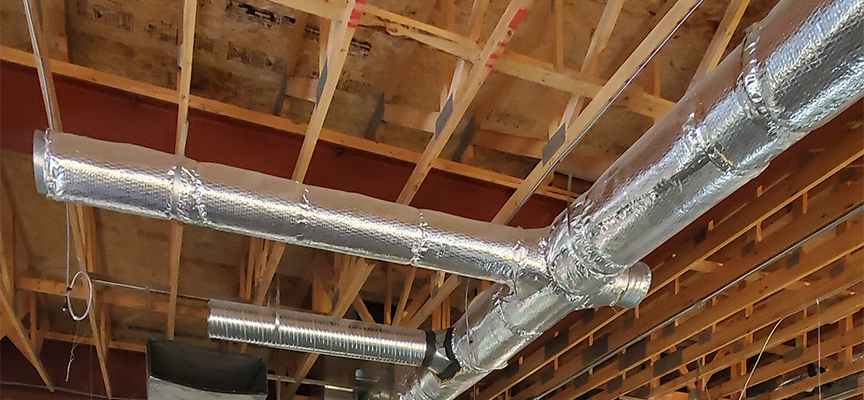February 7, 2025

Indoor air quality (IAQ) is a crucial aspect of maintaining a healthy and comfortable living environment.
In Canada, residents spend a significant amount of time indoors due to the cold climate. Therefore, ensuring the air inside our homes remains clean and free from pollutants is essential.
One often overlooked factor that can significantly impact IAQ is attic insulation. Proper attic insulation not only contributes to energy efficiency but also plays a vital role in enhancing the quality of the air we breathe.
Attic insulation serves as a barrier that regulates the exchange of air between the attic and the living spaces below.
When installed correctly, it can prevent the infiltration of pollutants, control moisture levels, and contribute to a healthier indoor environment. Here’s how:
Gaps or inadequacies in attic insulation can allow outdoor pollutants such as dust, pollen, and vehicle emissions to enter the home.
These contaminants can degrade IAQ and pose health risks to occupants. Proper insulation seals these gaps, acting as a barrier against external pollutants.
Moisture accumulation in the attic can lead to mold growth, which releases spores into the air and negatively impacts IAQ.
Effective attic insulation helps control moisture levels by preventing condensation and ensuring proper ventilation thereby inhibiting mold development.
Some insulation materials can emit volatile organic compounds (VOCs) over time, contributing to indoor air pollution. Choosing high-quality, low-emission insulation materials and ensuring proper installation can minimize this risk.
Selecting appropriate attic insulation is crucial for energy efficiency and maintaining good IAQ. Here are some common types of insulation materials and their implications for indoor air quality:
Fibreglass is a widely used insulation material known for its thermal performance. However, if not properly installed, it can release tiny fibres into the air, potentially causing respiratory irritation.
Ensuring that fibreglass insulation is well-sealed and covered can mitigate this issue.
Made from recycled paper products, cellulose insulation is treated with fire-retardant chemicals.
While it is effective in reducing air leakage, there is a potential for dust generation which can affect IAQ if the material becomes disturbed or deteriorates over time.
Spray foam provides excellent air-sealing properties, reducing the infiltration of outdoor pollutants. It also minimizes moisture issues thereby preventing mold growth.
However, it’s essential to use spray foam products that are low in VOCs to avoid indoor air contamination.
To ensure that attic insulation contributes positively to indoor air quality, consider the following best practices:
Engaging professional attic insulation installers ensures that the insulation is appropriate for your home’s specific needs and is installed correctly, reducing the risk of air leaks and moisture problems.
Before installing insulation, it’s crucial to seal any air leaks in the attic space. This prevents the movement of air—and associated pollutants—between the attic and living areas.
Adequate ventilation in the attic helps control moisture levels and prevents the buildup of indoor pollutants. Combining proper insulation with effective ventilation strategies promotes better IAQ.
Regularly inspecting attic insulation for signs of damage, moisture, or mould growth is essential. Addressing issues promptly maintains the integrity of the insulation and ensures continued protection of indoor air quality.
While enhancing indoor air quality is a significant advantage, proper attic insulation also offers additional benefits:
Well-insulated attics reduce the need for excessive heating and cooling, leading to lower energy consumption and utility bills.
Maintaining consistent indoor temperatures contributes to overall comfort, making living spaces more enjoyable year-round.
Homes with proper insulation are often more attractive to buyers, as they promise energy efficiency and a healthier living environment.
At Truerock Interior Systems, we specialize in delivering high-quality attic insulation, ceiling texture spray, and roof insulation services tailored to meet the unique needs of Canadian homeowners.
Our team of experts ensures that every project is executed with precision and care, enhancing your home’s comfort, energy efficiency, and indoor air quality. Ready to transform your living space? Contact us today to schedule your consultation!